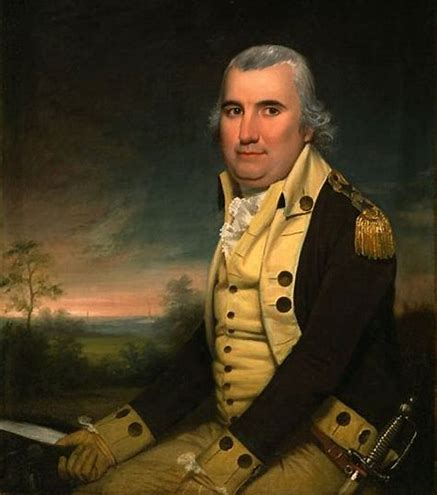The Pinckneys of South Carolina
 The founder of this family in America was Thomas Pinckney, who emigrated to South Carolina in the year 1692. He possessed a large fortune, and built in Charleston a stately mansion, which is still standing, unless it was demolished during the late war. A curious anecdote is related of this original Pinckney, which is about all that is now known of him. Standing at the window of his house one day, with his wife at his side, he noticed a stream of passengers walking up the street, who had just landed from a vessel that day arrived from the West Indies. The eldest son of Thomas was Charles Pinckney who embraced the legal profession and rose to be Chief Justice of the Province of South Carolina; hence, he is usually spoken of and distinguished from the rest of the family as "Chief Justice Pinckney." The son was educated in England where he was married. Returning to Charleston, he acquired a large fortune by the practice of his profession. A strange anecdote is related of his wife also. After he had been married many years without having children, a young lady named Eliza Lucas, daughter of an officer in the English army, visited Charleston. She was an exceedingly lovely and brilliant girl, and made a great stir in the province. She was particularly admired by the wife of the Chief Justice, who said one day in jest: "Rather than have Miss Lucas return home, I will myself step out of the way, and let her take my place." Within a few months after uttering thFrance. It was during the reign of the corrupt Directory that they performed this mission; and Talleyrand, the Minister of War, gave them to understand that nothing could be accomplished in the way of negotiation unless they were prepared to present to the government a large sum of money. The honest Americans objecting to this proposal, Talleyrand intimated to them that they must either give the money or accept the alternative of war. Then it was that the honest and gallant Charles Cotesworth Pinckney uttered the words which Americans will never forget till they have ceased to be worthy of their ancestors. Upon his return to the United States, war being imminent with France, he was appointed a Major-general in the army, and in the year 1800 he was a candidate for the Presidency. He lived to the year 1825, when he died at Charleston at the age of seventy-nine. His brother Thomas was the Governor of South Carolina in 1789, and in 1792 was appointed by General Washington Minister to Great Britain. . . .more . . .
The founder of this family in America was Thomas Pinckney, who emigrated to South Carolina in the year 1692. He possessed a large fortune, and built in Charleston a stately mansion, which is still standing, unless it was demolished during the late war. A curious anecdote is related of this original Pinckney, which is about all that is now known of him. Standing at the window of his house one day, with his wife at his side, he noticed a stream of passengers walking up the street, who had just landed from a vessel that day arrived from the West Indies. The eldest son of Thomas was Charles Pinckney who embraced the legal profession and rose to be Chief Justice of the Province of South Carolina; hence, he is usually spoken of and distinguished from the rest of the family as "Chief Justice Pinckney." The son was educated in England where he was married. Returning to Charleston, he acquired a large fortune by the practice of his profession. A strange anecdote is related of his wife also. After he had been married many years without having children, a young lady named Eliza Lucas, daughter of an officer in the English army, visited Charleston. She was an exceedingly lovely and brilliant girl, and made a great stir in the province. She was particularly admired by the wife of the Chief Justice, who said one day in jest: "Rather than have Miss Lucas return home, I will myself step out of the way, and let her take my place." Within a few months after uttering thFrance. It was during the reign of the corrupt Directory that they performed this mission; and Talleyrand, the Minister of War, gave them to understand that nothing could be accomplished in the way of negotiation unless they were prepared to present to the government a large sum of money. The honest Americans objecting to this proposal, Talleyrand intimated to them that they must either give the money or accept the alternative of war. Then it was that the honest and gallant Charles Cotesworth Pinckney uttered the words which Americans will never forget till they have ceased to be worthy of their ancestors. Upon his return to the United States, war being imminent with France, he was appointed a Major-general in the army, and in the year 1800 he was a candidate for the Presidency. He lived to the year 1825, when he died at Charleston at the age of seventy-nine. His brother Thomas was the Governor of South Carolina in 1789, and in 1792 was appointed by General Washington Minister to Great Britain. . . .more . . .South Carolina Wills and Estates

|
No comments:
Post a Comment